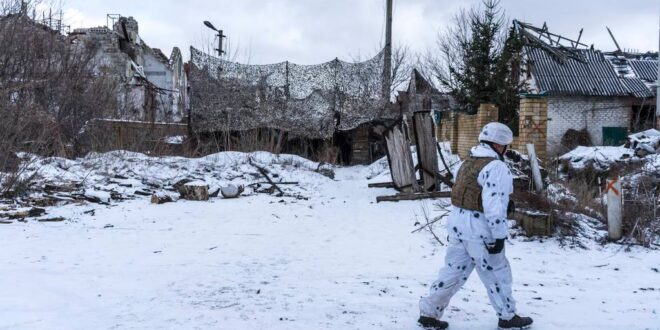After three successive rounds of discussions between the United States, Europe and Russia, the sides are as far apart on the ongoing Ukraine dispute as when the talks began. Moscow remains adamant that under no circumstances can Ukraine, a neighbor and former Soviet republic, join NATO (among other demands). The U.S. and its NATO allies reject Russia’s position and are just as insistent that Ukraine has the sovereign right to make its own foreign policy decisions.
The open-door policy, which allows NATO members to invite any European state into the alliance by unanimous consent, is at the core the dispute. NATO Secretary-General Jens Stoltenberg calls the open-door policy a “core principle” that can’t be negotiated away under the barrel of a Russian gun. Some former U.S. diplomats have argued that the fact NATO enlargement is even a topic at this stage is a diplomatic win for the Kremlin. One doesn’t have agree with this take in order to sympathize with it.
For the U.S., however, it’s not Russia’s geopolitical sensitivities that matter most—it’s whether a given policy serves core U.S. security interests. And as far as NATO’s open-door policy is concerned, keeping it alive for the sake of principle no longer makes sense for practical and strategic reasons.
First, the practical: NATO is too large as it is. Since 1997, the organization has nearly doubled in size, often taking in countries that are small, geopolitically insignificant, or unable to actually meet the alliance’s own defense spending guidelines (according to NATO estimates, only one-third of the alliance’s members fulfilled their spending obligations this year). Previous rounds of enlargement, particularly in the last few years, had little do with a potential member’s qualifications or ability to contribute to the security of the North Atlantic area. The most recent NATO inductees, Montenegro in 2017 and North Macedonia in 2020, have a collective GDP about half the size of Vermont’s entire economy and a total population barely the size of Brooklyn. Based on CIA data, Montenegro and North Macedonia boast a combined 9,500 active-duty soldiers. Nobody can seriously argue that including these countries in NATO makes the alliance any more capable or enhances NATO’s deterrence posture over Russia in any considerable way.
Second, a bigger alliance is not necessarily a stronger alliance. NATO may be composed of 30 members, but how many of them can be expected to meaningfully participate in alliance operations in the event of a conflict? While France and Slovenia technically have the same status within NATO, nobody in Europe is going to count on Slovenia, a nation with some 7,000 military personnel, to actually do much in a war-related contingency. It’s not even a given that Germany, Europe’s economic powerhouse, would be able to contribute significantly to the fight considering the Bundeswehr’s systemic operational shortcomings and readiness challenges. In fact, NATO already has trouble sustaining operations if the U.S. isn’t in the lead; the last time the alliance conducted a major military campaign (the 2011 bombing mission in Libya), it quickly depleted its munitions stock and struggled to maintain an adequate supply of strike aircraft. The size of an alliance, in other words, tells us next to nothing about its effectiveness.
Third, NATO enlargement entails a significant degree of risk to the United States. Traditionally, officials in Washington regard alliances as a net benefit. The more alliances the U.S. possesses, the logic goes, the safer and stronger the U.S. will be. As Secretary of State Antony Blinken and Defense Secretary Lloyd Austin wrote in a March 2021 op-ed. “Our alliances are what our military calls ‘force multipliers.’ We’re able to achieve far more with them than we could without them.” But if those same allies are weak, dependent, or uninterested in actually doing their fair share to make the alliance resilient, then they become security burdens, not assets.
This hits the U.S. the most, which has signed itself up to protecting dozens of countries around the world. Over time, such defense commitments can negatively impact U.S. military deployments, atrophy the overall health of the U.S. military, and distract Washington from other security priorities. It’s much harder to invest in an Indo-Pacific strategy when tens of thousands of U.S. forces are also expected to come to the defense of the European continent. The longer NATO enlargement remains U.S. policy, the more likely the U.S. will further extend itself.
Keeping the option of NATO enlargement on the table is a faulty policy on an ordinary day. In the case of Ukraine, it’s a disservice. The Ukrainian political leadership clearly believes inclusion into the alliance is its best avenue of keeping a more powerful Russia in check. Nobody, however, seriously believes Ukraine will be on a path to membership anytime soon (notwithstanding the 2008 Bucharest Declaration, which promised Kyiv membership in the future) or is even a decent candidate. U.S. and NATO officials, though, keep the open-door ajar as if it’s a legitimate proposition, giving Ukraine hope that one day it will eventually be welcomed into the alliance with open arms—a perfect example of moral hazard.
Being clear, honest, and consistent with Ukraine would be a far more moral undertaking and send Kyiv a tough but necessary message: You would be better served trying to find some kind of accommodation with Russia instead of hoping for a NATO bailout.
Next to Article 5, NATO’s open-door policy is one of the alliance’s most sacrosanct principles. All the same, it’s also outdated, purposeless, and counterproductive. The U.S. shouldn’t shut the door because of Russia’s righteous indignation—it should shut the door because such a policy stands on its merits.
 Eurasia Press & News
Eurasia Press & News




